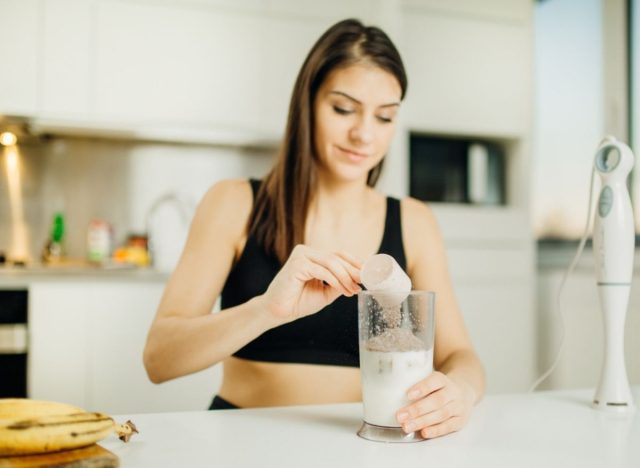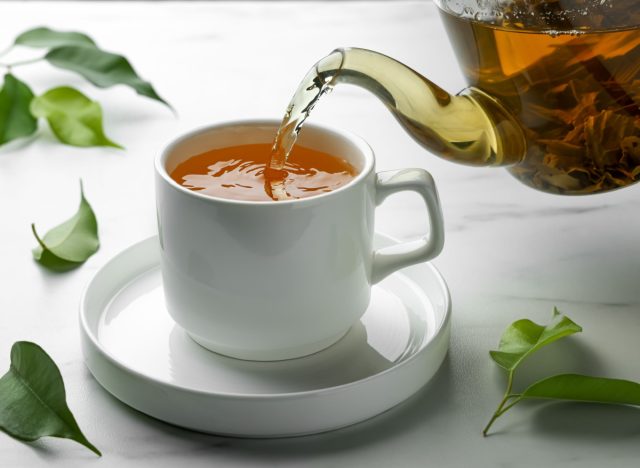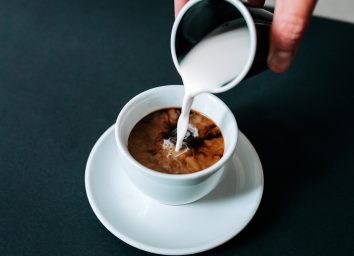5 Drinking Habits That Will Wreak Havoc on Your Metabolism

When trying to lose weight, we tend to focus on the solid stuff we stuff into our mouths: think pizza, Twinkies, Hershey's Kisses. But, that's only half the battle. We need to be aware of those sneaky beverages that add up and may undermine our good intentions. Your drinking habits play a key role in weight gain or loss and may also indirectly impact your metabolism in a negative way.
We'll explain how, but first, it's important to understand metabolism. The metabolic process is what happens when your body converts food and beverages into energy to fuel activity and all those bodily functions that occur even when you're sleeping. As you might imagine, when you're an infant and a child and rapidly growing muscle, bone, and other tissues, your metabolism is booming. It continues to expand until peaking at about age 20, when metabolic rate levels off until around age 60, according to a recent study in Science. At 60, metabolism generally slows. Why? Well, we tend to be less active as we age and we naturally lose muscle mass unless we really work to maintain it through resistance training. When you have less muscle on your skeleton, your metabolism slows, and you burn calories at a lower rate.
So, one way to speed up your metabolism is to build more calorie-burning muscle. But how about food and beverages to accompany this process? "No one food or beverage speeds up your metabolism," says Eatthis.com medical review board member Amy Goodson, MS, RD, a specialist in sports dietetics and author of The Sports Nutrition Playbook. "There are some things that can indirectly contribute to it, but not speed it up. It's really more that some drinks and drinking habits might help with weight loss and affect your metabolism."
So, here's what science and our experts say about possible drinking habits that are wreaking havoc on your metabolism. Then, make sure to check out The #1 Best Coffee for Your Metabolism.
You're not drinking high-protein beverages

To build metabolism-boosting muscle, your body needs the proper building blocks: adequate protein. Fortunately, you can get that from choosing the right beverages. "Drinking beverages with protein like those made with cow's milk, Greek yogurt, or protein powder might help keep your metabolism in high gear as well as curb your appetite," says Goodson. "Protein helps you feel full faster and keeps you feeling that way longer. That's because protein takes the most energy and time to break down and digest of all the macronutrients."
You choose sugary beverages over water
If you want your metabolism to function properly and the rest of your body to work optimally, you must be properly hydrated by consuming foods and beverages that contain water. But while soda and fruit juice can contribute to your water quota, most are loaded with added sugars that elevate blood glucose levels and calories that may lead to weight gain. Sports rehydration drinks fall into that category, too. Unless you are doing high-intensity or long-duration aerobic exercise like long-distance running, you may not burn off the calories you're consuming. That's why water is the beverage of choice for weight loss and supporting a healthy metabolism.
Are you getting enough water? Even mild dehydration can drain your energy and cause fatigue. Your water needs may be different from the next person's, but the U.S. National Academies of Sciences, Engineering, and Medicine have determined that roughly 15.5 cups of fluid daily is ideal for men and 11.5 is adequate for women. "Start tracking how much water your drink every day to see if your intake is at a healthy level," says National Institutes of Health-trained endocrinologist, Florence Comite, MD, founder of Comite Center for Precision Medicine & Health. "If you don't want to measure, an easy way to gauge proper hydration is making sure your urine is clear."
You don't stop at one or two

According to the 2020-2025 dietary guidelines for Americans, moderate alcohol consumption is defined as one drink per day for women and two drinks daily for men. One drink is equivalent to about 12 ounces of beer, 5 ounces of wine, or 1.5 ounces of 80-proof liquor. "If you choose to drink more than that, it can certainly knock your metabolism off balance," says Eatthis.com medical review board member Toby Amidor, MS, RD, Wall Street Journal best-selling author of Diabetes Create Your Plate Meal Prep Cookbook. What's more, beer, wine, and especially sugary cocktails made with fruit juice or soda can add considerable amounts of empty calories.
You like your nightcaps
Drinking alcohol late at night is especially notorious for messing with your metabolism by disrupting your sleep. "Although some folks believe that alcohol helps you sleep, it can do quite the opposite by disrupting the flow of normal sleep rhythms," says Amidor. If you do choose to drink, have your drink(s) at least 2 hours or longer before bedtime, she suggests. And, drink lots of water before and after consuming alcohol.
Your daily brew isn't green

Dietitians have long touted green tea as one of the most powerful drinks for weight loss. "The catechins found in green tea are antioxidants that have been shown to potentially increase fat burning and elevate metabolism," says Goodson. Also, the caffeine in green tea may boost your energy. To get the most from green tea, choose matcha, a type of green that's highly concentrated with catechins, says Goodson.
- Source: https://www.science.org/doi/10.1126/science.abe5017
- Source: https://www.nationalacademies.org/news/2004/02/report-sets-dietary-intake-levels-for-water-salt-and-potassium-to-maintain-health-and-reduce-chronic-disease-risk
- Source: https://www.dietaryguidelines.gov/sites/default/files/2020-12/Dietary_Guidelines_for_Americans_2020-2025.pdf









